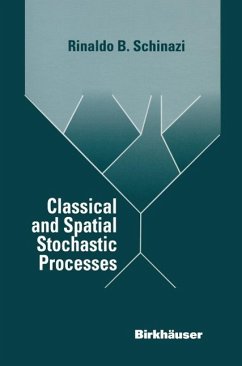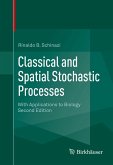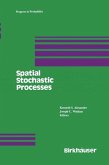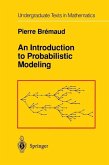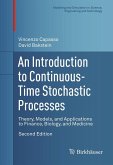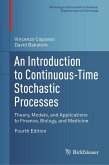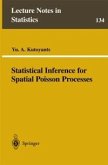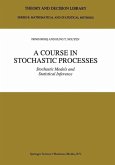This book is intended as a text for a first course in stochastic processes at the upper undergraduate or graduate levels, assuming only that the reader has had a serious calculus course-advanced calculus would even be better-as well as a first course in probability (without measure theory). In guiding the student from the simplest classical models to some of the spatial models, currently the object of considerable research, the text is aimed at a broad audience of students in biology, engineering, mathematics, and physics. The first two chapters deal with discrete Markov chains-recurrence and tran sience, random walks, birth and death chains, ruin problem and branching pro cesses-and their stationary distributions. These classical topics are treated with a modem twist: in particular, the coupling technique is introduced in the first chap ter and is used throughout. The third chapter deals with continuous time Markov chains-Poisson process, queues, birth and death chains, stationary distributions. The second half of the book treats spatial processes. This is the main difference between this work and the many others on stochastic processes. Spatial stochas tic processes are (rightly) known as being difficult to analyze. The few existing books on the subject are technically challenging and intended for a mathemat ically sophisticated reader. We picked several interesting models-percolation, cellular automata, branching random walks, contact process on a tree-and con centrated on those properties that can be analyzed using elementary methods.
Dieser Download kann aus rechtlichen Gründen nur mit Rechnungsadresse in A, B, BG, CY, CZ, D, DK, EW, E, FIN, F, GR, HR, H, IRL, I, LT, L, LR, M, NL, PL, P, R, S, SLO, SK ausgeliefert werden.
"An appetizing textbook for a first course in stochastic processes. It guides the reader in a very clever manner from classical ideas to some of the most interesting modern results... All essential facts are presented with clear proofs, illustrated by beautiful examples... The book is well organized, has informative chapter summaries, and presents interesting exercises. The clear proofs are concentrated at the ends of the chapters making it easy to find the results. The style is a good balance of mathematical rigorosity and user-friendly explanation." -Biometric Journal "This small book is well-written and well-organized...Only simple results are treated...but at the same time many ideas needed for more complicated cases are hidden and in fact very close. The second part is a really elementary introduction to the area of spatial processes...All sections are easily readable and it is rather tentative for the reviewer to learn them more deeply by organizing a course based on this book. The reader can be really surprised seeing how simple the lectures on these complicated topics can be. At the same time such important questions as phase transitions and their properties for some models and the estimates for certain critical values are discussed rigorously...This is indeed a first course on stochastic processes and also a masterful introduction to some modern chapters of the theory." -Zentralblatt Math.

